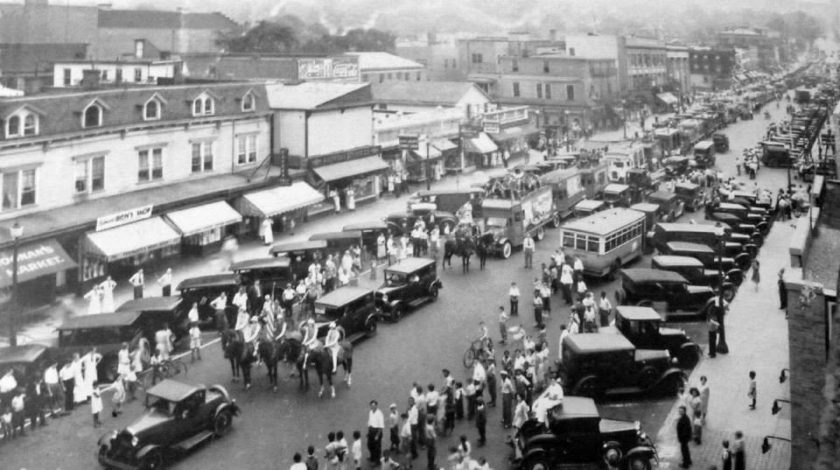
ENGLEWOOD, N.J.—Pictured here, a scene from August of 1931 shows the Downie Bros. Wild Animal Circus as it parades through downtown Englewood. This photo was taken on Palisade Avenue.

In the spring of 1926, 40-year show business veteran Andrew Downie pioneered a motorized circus that would travel by truck instead of railway. The show was transported on 41 trucks, five trailers and three tractors. It included five elephants, a lion show, acrobats, clowns, performers standing on horses, a sideshow and more.
In the summer of 1931, the circus’ arrival should have been a joyous event for the children of Englewood—but, unfortunately, the reality was pretty disappointing.
Due to several reported cases of infantile paralysis—polio—in Bergen County at the time, city officials had to take drastic action to stave off a feared epidemic.
Because the polio vaccine has nearly eradicated the disease, it isn’t a threat that many modern parents consider. A highly infectious virus that spreads mainly among young children, in some cases polio can affect the spinal cord, leading to muscle weakness and, in extreme cases, paralysis, mainly in the legs.
There were many polio epidemics nationwide in the early 20th century, with the first major outbreak in New Jersey taking place in 1916. From then on, nearly every summer some portion of America would be hit by the virus. In 1955, Dr. Jonas Salk became a national hero when he developed a safe and effective polio vaccine.
Of course, for the kids of 1931 Englewood, that vaccine was a long way away. Local officials at the time fought back the only way they knew how: all kids under age 16 were barred from crowded places where the disease could easily spread—local theaters, “motion picture shows,” circuses and swimming pools—until the Board of Health determined the threat had subsided. Mayor Cornelius Kitcher told the Englewood Police Department to enforce the rule with no exceptions.
The ruling was put into effect four days before the circus was scheduled to come into town, so all of the children were barred from the big top. Imagine the tantrums thrown in Englewood that week!
It was a strange day when the circus arrived—the big tent was there, with the elephants, horses, camels and clowns, the barkers touting the wonders of the sideshow, the streamers and pennants. Yet, completely devoid of children, the poorly attended event was missing its spark. Some youngsters stood outside the tent during the matinee and evening performances, trying to listen to what was happening inside.
The kids finally got a glimpse of the show when the parade came down Palisade Avenue at noon, as shown in the photograph above. Because it was outdoors in the open air, children were allowed to attend the procession. They lined up all along the parade route, and when it stopped for about five minutes, they went wild running around looking at all the animals and performers.
The day after the circus, two more cases of polio were diagnosed in Bergen County, as two 8-year-old boys, one from Ridgewood and the other from Rutherford, came down with the disease.
